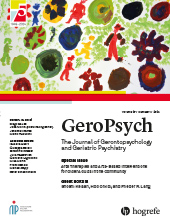Leichte kognitive Beeinträchtigung bei älteren depressiven Patienten
Mild Cognitive Impairment in Elderly Depressed Patients
Abstract
Zusammenfassung: Bei älteren depressiven Patienten bestehen gelegentlich kognitive Beeinträchtigungen vom Ausmaß einer Demenz. Dieses dementielle Syndrom bildet sich bei einem Teil der Patienten mit dem Abklingen der Depression zurück, stellt aber einen Risikofaktor für die Entwicklung einer irreversiblen Demenz dar. Unklar ist bislang die prognostische Bedeutung leichter kognitiver Einschränkungen, die nicht das Ausmaß einer Demenz erreichen. Wir untersuchten bei 24 älteren depressiven Patienten (mittleres Alter: 72,2 Jahre) die Schwere der depressiven Symptomatik und das Ausmaß kognitiver Beeinträchtigungen vor und nach einer sechswöchigen antidepressiven Behandlung. Ausschlußkriterium war ein Mini-Mental-State Wert unter 24. 16 von 24 Patienten litten vor Behandlung an einer leichten kognitiven Beeinträchtigung. Bei der Nachuntersuchung von 14 dieser Patienten zeigte sich bei 10 ein Fortbestehen leichter kognitiver Beeinträchtigungen. Prädiktiv für das Weiterbestehen der Beeinträchtigungen war das Ausmaß der Einschränkungen im Kurzzeitgedächtnis vor Behandlung. Kein Zusammenhang bestand zwischen dem Ausmaß kognitiver Einschränkungen und der Schwere der Depression. Diese Befunde weisen auf eine eigenständige Bedeutung leichter kognitiver Beeinträchtigungen bei älteren depressiven Patienten hin. Eine engmaschige Betreuung dieser Patienten erscheint vor diesem Hintergrund angebracht, um bei einer weiteren Verschlechterung des kognitiven Leistungsvermögens frühzeitig intervenieren zu können.
Summary: Cognitive impairment classifying for dementia syndrome is occasionally detected in patients suffering from old-age depression. When depression improves, cognitive function also may reverse to normal, but these patients are at greater risk for developing irreversible dementia in the further course. The prognostic significance of mild cognitive impairment in old-age depression is not known yet. We examined the severity of depressive symptoms and of cognitive impairment in 24 elderly depressed patients (mean age: 72.2 years) before and after a 6 week antidepressant treatment. Patients scoring lower than 24 in the Mini Mental State Examination were excluded from the study. 16 patients suffered from mild cognitive impairment. Reexamination of 14 of them after treatment confirmed the persistence of mild cognitive impairment in 10. The extent of impairment in short-term memory before treatment predicted the persistence of cognitive impairment. There was no correlation between the extent of cognitive impairment and the severity of depression. These findings point to an independent significance of mild cognitive impairment in old-age depression. It is suggested that patients with old-age depression suffering from mild cognitive impairment need close follow up in order to detect further cognitive decline and start intervention early.
Literatur
(1997). Clinically defined vascular depression. American Journal of Psychiatry , 154, 562– 565
(1997). «Vascular depression» hypothesis. Archives of General Psychiatry , 54, 915– 922
(1993). The course of geriatric depression with «reversible dementia»: A controlled study. American Journal of Psychiatry , 150, 1693– 1699
(1989). Chronicity and relapse in geriatric depression. Biological Psychiatry , 26, 551– 564
(1995). Depression in late life. A comparison of symptoms and risk factors in early and late onset cases. British Journal of Psychiatry , 167, 649– 652
(1997). Prefrontal dysfunktion in depressed patients performing in a complex planning task: A study using positron emission tomography. Psychological Medicine , 27, 931– 942
(1993). Incidence of silent cerebral infarction in patients with major depression. Stroke , 24, 1631– 1634
(1975). «Mini Mental State»: A practical method for grading the cognitive state of patients for the clinician. Journal of Psychiatric Research , 12, 189– 198
(1994). Background factors and clinical symptoms of major depression with silent cerebral infarction. Stroke , 25, 798– 801
(1997). Impact of mild cognitive impairment on survival in very elderly people: Cohort study. British Medical Journal , 315, 1053– 1054
(1997). Qualitative magnetic resonance imaging findings in geriatric depression. Possible link between later-onset depression and Alzheimer's disease. Psychological Medicine , 27, 421– 431
(1967). Development of a rating scale for primary depressive illness. British Journal of Social and Clinical Psychology , 6, 278– 296
(1997). Symptom severity and cognitive impairment in chronically hospitalised geriatric patients with affective disorders. British Journal of Psychiatry , 170, 369– 374
(1997). Subcortical hyperintensities on magnetic resonance imaging in patients with severe depression. A longitudinal evaluation. Biological Psychiatry , 42, 367– 374
(1991). Psychiatric history and related exposures as risk factors for Alzheimer's disease: A colloborative re-analysis of case control studies. EURODERM Risk Factors Research Group. International Journal of Epidemiology , 20, (Suppl. 2) 43– 47
(1997). Brainstem evoked response abnormalities in late-life depression with vascular disease. American Journal of Psychiatry , 154, 970– 975
(1993). Neuroanatomic substrates of depression in the elderly. Journal of Geriatric Psychiatry and Neurology , 6, 39– 58
(1988). Leukoencephalopathy in patients diagnosed as major depressive. Biological Medicine , 23, 519– 522
(1997). Cognitive function in major depression and Parkinson disease. Archives of Neurology , 54, 982– 986
(1997). Distractibility and processing resource deficit in major depression. Evidence for two deficit attentional processing models. Journal of Nerve and Mental Disease , 185, 542– 548
(1986). Phenomenological comparison of post stroke depression and functional depression. American Journal of Psychiatry , 143, 527– 529
(1990). Memory complaints and impairment in normal, depressed and demented elderly persons identifies in a community survey. Archives of General Psychiatry , 47, 224– 227
(1983). Hypertension and DSM-III depression in psychiatric outpatients. American Journal of Psychiatry , 140, 1072– 1074
(1990). Depression and cerebrovascular disease. Journal of Clinical Psychiatry , 51, (Suppl. 7) 26– 31
(1984). Mood disorders in stroke patients: Importance of location of lesions. Brain , 107, 81– 93
(1995). Effects of major deppression on the cognitive function of younger and older subjects. Psychological Medicine , 25, 285– 296
(1996). Personality: A moderator of the relation between cognitive functioning and depression in adults aged 55-85?. Journal of Affective Disorders , 41, 229– 240
(1991). Internationale Klassifikation psychischer Störungen. ICD-10 Kapitel V (F). Klinisch-diagnostische Leitlinien . Bern: Huber
(1996). Strukturiertes Interview für die Diagnose einer Demenz vom Alzheimer Typ, der Multiinfarkt- (oder vaskulären) Demenz und Demenzen anderer Ätiologie nach DSM-III-R, DSM-IV uns ICD-10 SIDAM . Bern: Huber


